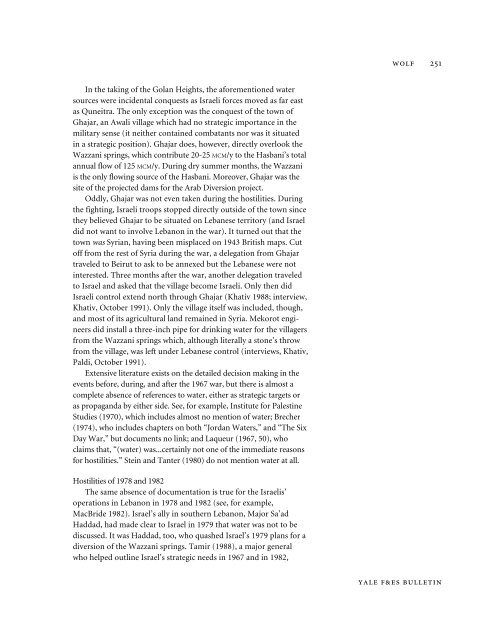Hydrostrategic Decisionmaking and the Arab ... - Yale University
Hydrostrategic Decisionmaking and the Arab ... - Yale University
Hydrostrategic Decisionmaking and the Arab ... - Yale University
You also want an ePaper? Increase the reach of your titles
YUMPU automatically turns print PDFs into web optimized ePapers that Google loves.
WOLF 251In <strong>the</strong> taking of <strong>the</strong> Golan Heights, <strong>the</strong> aforementioned watersources were incidental conquests as Israeli forces moved as far eastas Quneitra. The only exception was <strong>the</strong> conquest of <strong>the</strong> town ofGhajar, an Awali village which had no strategic importance in <strong>the</strong>military sense (it nei<strong>the</strong>r contained combatants nor was it situatedin a strategic position). Ghajar does, however, directly overlook <strong>the</strong>Wazzani springs, which contribute 20-25 MCM/y to <strong>the</strong> Hasbani’s totalannual flow of 125 MCM/y. During dry summer months, <strong>the</strong> Wazzaniis <strong>the</strong> only flowing source of <strong>the</strong> Hasbani. Moreover, Ghajar was <strong>the</strong>site of <strong>the</strong> projected dams for <strong>the</strong> <strong>Arab</strong> Diversion project.Oddly, Ghajar was not even taken during <strong>the</strong> hostilities. During<strong>the</strong> fighting, Israeli troops stopped directly outside of <strong>the</strong> town since<strong>the</strong>y believed Ghajar to be situated on Lebanese territory (<strong>and</strong> Israeldid not want to involve Lebanon in <strong>the</strong> war). It turned out that <strong>the</strong>town was Syrian, having been misplaced on 1943 British maps. Cutoff from <strong>the</strong> rest of Syria during <strong>the</strong> war, a delegation from Ghajartraveled to Beirut to ask to be annexed but <strong>the</strong> Lebanese were notinterested. Three months after <strong>the</strong> war, ano<strong>the</strong>r delegation traveledto Israel <strong>and</strong> asked that <strong>the</strong> village become Israeli. Only <strong>the</strong>n didIsraeli control extend north through Ghajar (Khativ 1988; interview,Khativ, October 1991). Only <strong>the</strong> village itself was included, though,<strong>and</strong> most of its agricultural l<strong>and</strong> remained in Syria. Mekorot engineersdid install a three-inch pipe for drinking water for <strong>the</strong> villagersfrom <strong>the</strong> Wazzani springs which, although literally a stone’s throwfrom <strong>the</strong> village, was left under Lebanese control (interviews, Khativ,Paldi, October 1991).Extensive literature exists on <strong>the</strong> detailed decision making in <strong>the</strong>events before, during, <strong>and</strong> after <strong>the</strong> 1967 war, but <strong>the</strong>re is almost acomplete absence of references to water, ei<strong>the</strong>r as strategic targets oras propag<strong>and</strong>a by ei<strong>the</strong>r side. See, for example, Institute for PalestineStudies (1970), which includes almost no mention of water; Brecher(1974), who includes chapters on both “Jordan Waters,” <strong>and</strong> “The SixDay War,” but documents no link; <strong>and</strong> Laqueur (1967, 50), whoclaims that, “(water) was...certainly not one of <strong>the</strong> immediate reasonsfor hostilities.” Stein <strong>and</strong> Tanter (1980) do not mention water at all.Hostilities of 1978 <strong>and</strong> 1982The same absence of documentation is true for <strong>the</strong> Israelis’operations in Lebanon in 1978 <strong>and</strong> 1982 (see, for example,MacBride 1982). Israel’s ally in sou<strong>the</strong>rn Lebanon, Major Sa’adHaddad, had made clear to Israel in 1979 that water was not to bediscussed. It was Haddad, too, who quashed Israel’s 1979 plans for adiversion of <strong>the</strong> Wazzani springs. Tamir (1988), a major generalwho helped outline Israel’s strategic needs in 1967 <strong>and</strong> in 1982,YALE F&ES BULLETIN
















